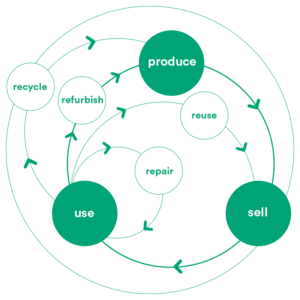There’s something magical about finding a special second-hand item. Old sweaters, dressing tables, coffee cups, whiskey tumblers, sets of tools and old racing bicycles just manage to convey something sacred. When we find these items and bring them into our own lives, they seem to express a certain power. Laden with their own history yet promising new adventures and special moments, these items can often have huge emotional significance for their owner, and often show up in the most unexpected of places.
However, the benefits of finding and using second-hand goods extend well beyond their emotional impact. Learning to search for used goods before buying new items is a practice that carries a wide range of economic and ecological advantages.
Firstly, buying used goods from other members of your community can help to keep money circulating within your local and interpersonal economy. This helps to develop increased economic strength and resilience when compared to buying new products from the vertical supply chains which extend outside of your community.

Source: rts.com
This process becomes even more effective when goods and services can be exchanged in forms other than money. Diversifying our sources of income and sustenance is a central principle of social permaculture, as it helps members of the community to identify the different skill sets and resources available within that community, and simultaneously helps to strengthen social ties. Offering your old clothing in exchange for some gardening work, for example, is a fantastic way to do this. These practices also all help to work towards supporting the circular economy.
Learning to prioritize pre-owned items over newly-produced ones also helps to improve your environmental impact. Producing new goods and disposing of old ones is not only an environmentally damaging process, but also a very rapid one; a process which is well explained in The Story of Stuff. This causes a wide range of problems, from ecological degradation due to the extraction of new materials, to environmental pollution produced by incinerators.
This is why converting “waste” or unwanted products into a useful resource for somebody else is such a central tenet of the zero-waste movement. By reframing waste as a resource, we can develop an economy that relies less on harmful extraction, and instead relies more on the continued reuse of materials.
Whilst it’s wonderful to circulate second-hand goods within our local community, sometimes this can be a difficult process. Perhaps there’s nobody in your town who wants to sell an old computer, or your taste in clothing is slightly too vibrant to attract local customers.
This is why swap websites can be so helpful for keeping second-hand goods moving in the economy. Many of these sites give their users access to a wide variety of goods and services which can be swapped online for free, providing flexibility, choice, and most importantly, a great opportunity to make environmentally conscious decisions. To help you get started, we’ve created a list of 10 of the best trade websites for swapping services and reusing goods.
SwapRight
SwapRight is a free website for swapping and bartering services from babysitting to van-hire. You can begin either by posting the services that you are able to provide or by browsing the posts which already exist. Users are then able to contact one another anonymously before agreeing on how they wish to exchange their services.
HomeExchange
HomeExchange is possibly one of the best travel options available online, as it gives you unlimited access to a global range of properties for the annual subscription price of $175.
HomeExchange is an online swap website for homes, where users can list their properties, and then stay in each others’ properties when they are vacant. With over 40,000 homes listed across 142 counties, HomeExchange opens up a wide range of opportunities for global travel, weekends away in the countryside or city breaks. What’s more, HomeExchange includes a guarantee of your home and the exchange within their subscription fee, allowing you complete peace of mind to travel and swap accommodation.
Rehash
Rehash started out as a company that designed clothing from other recycled clothing but quickly realized they could have a greater effect by facilitating the reuse of clothes by others. Subsequently, they’ve become a leading clothing swap website. Since they made the shift in their impact-driven mission, they have helped over 23,000 items of clothing to find a new home. With their well-developed clothing-categorization system, they can help you to find exactly the items you’re looking for.
Paperbackswap
For avid readers, Paperbackswap may be the most exciting site on the internet. Acting like an enormous library, this site allows users to post the books they have available. In exchange, users are given access to over 1 million other books, which will be sent straight to your door. The site and the books your order are also completely free; you only have to pay for postage on the books you send.
Swap.com
Swap.com is an excellent website for buying high-quality, second-hand clothing. Whilst this website is not a free swap site, its exclusive selection criteria make them a perfect home for and source of high-end second-hand clothing, meaning they help to keep goods moving and clothing out of landfills.
SharedEarth
SharedEarth is a free swap site that is doing fantastic work to support guerilla gardening. The site helps the owners of unused land to connect with farmers and gardeners who need the space to grow crops. In doing so, SharedEarth is helping to utilize land to increase biodiversity, develop food security, and improve general well-being.
Freecycle
The central goal and philosophy of Freecycle is to keep “good stuff out of landfills”. This general swap site works to create local trading networks within towns across the globe. Once you have joined a local “town” you can then swap goods and services for free within your area. The site also allows you to create a more personal “Friends Circle” to help you easily swap stuff for free within your own, self-selected community.
Art material swap sites
There are plenty of localized swap sites for artists who wish to find or give away art supplies. Like the 10 East Art website, most of the websites for these art swaps act as advertisement and information pages for in-person meetups. These in-person meetups can be found across the United States. Not only can they help to keep down the cost of art supplies, but they also help to keep potentially-toxic art materials out of landfills.
Game TZ 
Game TZ is an essential space for gamers, acting as a platform for you to buy, sell and trade games. With their built-in reputation system, Game TZ assurance, security, and an unlimited supply of entertainment.
Simbi
Simbi is a powerful and versatile services exchange platform, which allows users to provide their services to one another, either in a direct exchange or for Simbi Credit. They also offer a brilliant service for those who want to get started on Simbi, but don’t know what to offer. Their Skills Quiz helps users to identify what they can provide for others, thus helping people to empower and upskill themselves, whilst gaining access to others’ services, and working to strengthen the extra-monetary economy.
Whilst these are some of the best websites we’ve found, there are plenty of other ways that you can swap and trade within your community; you just need a little bit of creativity. For some circular economy and zero-waste inspiration, check out the blog, or learn more about the zero-waste movement on our website.



